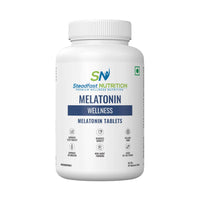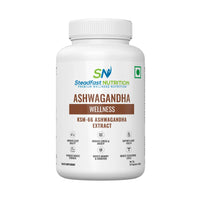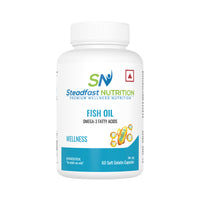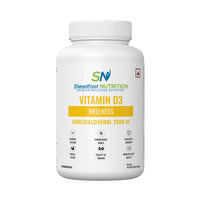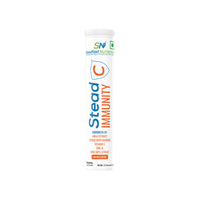Table of Content
Stress has become a common part of modern life due to work and academic pressure, financial and relationship issues and illness. It affects mental and physical health, leading to conditions like anxiety, depression, fatigue, headaches, digestive problems, and a weakened immune system. Chronic stress can increase the risk of serious health issues like high blood pressure, uncontrolled sugars, or the risk of developing diseases. While lifestyle changes like regular exercise, a healthy diet, and proper sleep are key to managing stress, supplements for stress relief may also help alleviate its effects.
Effectively managing stress is essential for overall well-being. This involves adopting healthy coping mechanisms like regular exercise, relaxation techniques, and a balanced diet. Expert guidance from health professionals, such as therapists or wellness coaches, can provide personalised strategies to combat stress. Certain supplements for stress, too, offer a simple and safe way to manage stress levels by supporting the body's natural response towards stress.
By managing stress properly, individuals can improve their mood, energy levels, and resilience. In doing so, they reduce the risk of long-term health complications and enhance both mental and physical health, leading to a more balanced and fulfilling life.
Best Supplements for Stress Management
Now that we are through the gist of stress, here's a list of the best stress relief supplements.
Ashwagandha
Ashwagandha is an adaptogenic herb traditionally used in Ayurvedic medicine to help the body manage stress by regulating the hypothalamic-pituitary-adrenal (HPA) axis. It combats stress by reducing cortisol levels and alleviating anxiety and depression. In addition to its calming effects, ashwagandha may improve sleep quality, enhance memory, and boost overall psychological well-being. Ashwagandha supports the regeneration of neurons, modulating the brain’s oxidative stress, which improves thinking, learning, and remembering power, supporting brain health. It also exhibits anti-inflammatory properties keeping you away from conditions like Schizophrenia, Parkinson’s, and alzheimer’s disease.
Multiple studies have found that ashwagandha helps lower stress, anxiety, and depression by reducing levels of cortisol, the body’s primary stress hormone. A 2019 study showed a 23% reduction in morning cortisol levels after taking 240 mg of ashwagandha daily for 60 days.
A 2021 clinical study involving 125 adults showed that taking 300 mg of ashwagandha extract daily for 90 days improved memory, focus, and psychological well-being.
Available in capsules, pills, or powder, ashwagandha can be added to food or drinks, although the powder may have a bitter taste. While generally safe, it can be used for a short term.
Melatonin
Melatonin, a hormone secreted by the pineal gland, regulates the sleep-wake cycle, its levels rising at night to promote sleep. Stress may impair the release of melatonin receptors, increasing anxiety and disturbing sleep.
A review of 12 trials found melatonin to be as effective as midazolam (a sedative) in reducing pre-surgical anxiety. The studies primarily involved older patients and lacked female participants, making it unclear how melatonin affects younger people and women, who are more prone to anxiety. Melatonin’s ability to improve sleep may indirectly reduce stress, as poor sleep can exacerbate stress levels.
Melatonin’s influence as a stress management supplement is tied to its impact on sleep. Stress can lead to insomnia or poor sleep quality, and sleep deprivation can, in turn, heighten stress levels. By improving sleep, melatonin may indirectly help reduce stress.
In addition to its sleep-promoting effects, melatonin may help with stress management. The hormone helps promote relaxation by reducing cortisol levels, a key stress hormone. By promoting more restorative sleep, melatonin can help the body cope better with daily stress. Since stress and sleep problems are often interlinked, improving sleep quality with melatonin can indirectly reduce stress.
A 2019 review involving 205 participants found that melatonin supplements reduced the time it took people to fall asleep and increased total sleep duration, though it did not significantly improve overall sleep quality compared to a placebo. Nonetheless, better sleep duration alone can help the body manage stress more effectively. Melatonin may also help with stress by alleviating stress-related insomnia.
Omega-3
Omega-3 fatty acids, particularly those found in fish oil and krill oil (derived from small shellfish), are well-known for their benefits on cardiovascular health, but research suggests they may also have a positive impact on brain function, mood, and anxiety. Omega-3s, such as eicosapentaenoic acid (EPA) and docosahexaenoic acid (DHA), play crucial roles in reducing inflammation and supporting overall brain health, lowering the risk of cellular damage. Omega 3s are also associated with providing structural support to the brain. They prevent risk off neuro-degeneration protecting against cognitive decline. These compounds are essential fats the body cannot produce on its own, so they must be obtained through diet or supplements to alleviate stress. Omega-3s having anti-inflammatory actions can easily pass through the membranes of the brain cells relieving stress and lowering the risk of depression.
Improved cardiovascular health can indirectly benefit mental well-being by reducing anxiety levels, and vice-versa. Poor cardiovascular health and chronic inflammation are thought to contribute to anxiety and depression that may lead to the risk of stroke and heart attacks. By maintaining heart health, omega-3s may help alleviate anxiety.
A 2018 systematic review and meta-analysis analyzed data from 19 clinical trials and concluded that omega-3 supplements, such as fish oil, may be helpful for individuals with anxiety. Another 2018 review found that low intake of omega-3 fats is associated with a higher risk of anxiety and depression. This suggests that adequate omega-3 intake, whether through diet or supplementation with omega-3 capsules, may help prevent these mental health conditions.
Certain studies showed effectiveness but with limited effect of omega-3 being used additionally with prescribed antidepressants in people with depression.
Vitamin D
Vitamin D, often referred to as the “sunshine vitamin,” plays a crucial role in mood regulation and overall mental health. Low levels of vitamin D have been associated with depressive symptoms, impaired stress coping mechanisms, and disrupted cortisol rhythms. To maintain optimal vitamin D levels, which are 600 IU for almost all age groups, individuals can get maximum Vitamin D intake from sun exposure. One can also rely on other sources like vitamin D-rich foods, fortified milk, or vitamin D supplements.
Despite being a common nutrient deficiency, it's important to determine optimal levels through a blood test before starting supplementation. While a 2021 systematic review found insufficient evidence supporting vitamin D supplementation in healthy individuals, it suggested that vitamin D may be more beneficial when combined with exercise or obtained from food sources. A study published in Nature Journal found that higher sun exposure and vitamin D intake are linked with a lower likelihood of having high perceived stress among physically active individuals.
Vitamin D has been shown to improve mood and increase serotonin levels when adequate vitamin D levels are maintained. It also aids calcium absorption and has anti-inflammatory and immune-boosting properties, which may contribute to stress reduction, particularly in those deficient in the vitamin. A small study indicated that participants taking 1,600 IU of vitamin D daily for four months during winter maintained their vitamin D levels and experienced less prolonged stress than those taking a placebo.
Other studies have shown improvements in anxiety, depression, and stress when high doses of vitamin D capsules are combined with probiotics or omega-3 supplements. However, it is essential to consult a healthcare professional for vitamin D level testing and to avoid potential toxicity from excessive supplementation. While research has suggested a link between vitamin D deficiency and depression & anxiety disorders, results have been mixed, indicating the need for further investigation. Vitamin D may possess immuno-modulatory, neuro-protective properties supporting brain tissues and benefitting brain health.
Adequate vitamin D levels are hence associated with improved mood and low stress with lower chances of developing depression, especially in individuals with deficiencies. Vitamin D can be obtained through sun exposure, diet, or supplements.
Magnesium
Magnesium is an essential mineral vital for numerous bodily functions, including muscle and nerve support, blood sugar regulation, and blood pressure control. It plays a crucial role in regulating the body's stress response by releasing stress hormones. A deficiency of magnesium can increase stress and anxiety, creating a cycle where stress further depletes magnesium levels. Research indicates that magnesium deficiency is linked to heightened anxiety, irritability, insomnia, and depression. For instance, a 2017 systematic review found that magnesium supplements may improve measures of anxiety in susceptible individuals, although the quality of evidence was considered poor. Additionally, a 2016 review noted benefits for those with anxiety related to premenstrual syndrome who took magnesium supplements.
While magnesium supplementation may alleviate mild anxiety, more studies are needed for conclusive evidence. Foods rich in magnesium may also be included in the diet, such as spinach, almonds, dark chocolate, and quinoa, to maintain adequate levels. Magnesium acts as a natural vasodilator, dilating the arteries, enhancing blood flow and promoting relaxation, which improves sleep quality. A study published in the Journal of Research in Medical Sciences showed that magnesium supplementation could improve subjective measures of insomnia, including sleep efficiency and onset latency.
Magnesium can be taken as a supplement, but starting with a low dose is recommended to avoid side effects like diarrhoea. Overall, magnesium is crucial for managing stress and anxiety, supporting the nervous system, and promoting relaxation and better sleep.
Vitamins B3, B6 & B12
B vitamins are an essential supplement for stress management, synthesising the neurotransmitters that regulate mood, including serotonin, dopamine, and GABA. Deficiencies in B vitamins like B3 (niacin), B6 (pyridoxine), B9 (folate), and B12 are linked to increased risks of stress disorders, anxiety, and depression. Adequate intake of B vitamins enhances stress resilience by optimising neurotransmitter synthesis. A 2019 systematic review found that daily supplementation with B vitamins significantly improved mood and reduced stress levels in both healthy individuals and those at risk.
Specific vitamins, particularly B12 and B6, play crucial roles in mental health. A 2022 study indicated that nurses with lower B6 and B12 intake had a higher likelihood of experiencing emotional issues. B12, known as "the memory vitamin," is vital for creating melatonin and serotonin, and its deficiency can lead to mental confusion and difficulty coping with stress.
Research shows that B complex vitamins may improve mood and lower workplace stress. A study involving 60 participants found that those taking B vitamins reported significantly lower stress levels compared to a placebo group. Additionally, a 2017 study linked low B12 levels to higher rates of depression and anxiety, while a 2018 study showed that individuals consuming B vitamin-rich foods, like yeast-based spreads fortified with B12, had better anxiety and stress scores. Low levels of Vitamin B12 also raise the homocysteine levels linked to supporting psychiatric symptoms and mental illness, deteriorating the brain health, and leading to cognitive decline.
While most people can obtain sufficient B vitamins through a varied diet, those on vegetarian or vegan diets may require supplements, especially for B12. B vitamins generally do not interact with anxiety medications but may affect other prescriptions. Overall, these vitamins are vital for energy production, cognitive function, and stress reduction, with research indicating that higher B vitamin levels are associated with lower stress.
L-Theanine
L-theanine is an amino acid primarily found in green tea and is known for its ability to enhance the production of calming neurotransmitters like GABA, serotonin, and dopamine. This modulation helps reduce stress while improving focus and concentration. L-Theanine helps lower anxiety and stress and reduces insomnia. As By maintaining mental health, it improves alertness and calmness. A 2019 study from a controlled trial published in Nutrients Journal involving 30 participants indicated that daily supplementation of 200 mg of L-theanine for four weeks alleviated symptoms of anxiety, depression, and insomnia. Additionally, a review of nine peer-reviewed studies found that a daily intake of 200 to 400 mg may effectively reduce stress and anxiety in individuals facing stressful situations.
L-theanine promotes relaxation without sedative effects, making it a suitable option during stressful times. Another study showed that taking 200 mg of L-theanine daily significantly improved depression symptoms, sleep quality, cognitive function, and stress levels compared to a placebo group. In another study involving 34 participants, those who consumed a beverage with 200 mg of L-theanine experienced reduced cortisol levels in response to a multitasking stress task.
L-theanine is generally safe for short-term use, and for those who prefer not to take supplements, green tea itself is a good source of L-theanine. A randomised controlled trial found that consuming at least 300 ml of low-caffeine green tea significantly reduced stress markers compared to regular green tea, likely due to the inhibitory effects of caffeine on L-theanine’s effectiveness.
While L-theanine is well tolerated, it’s important to consult a doctor for dosage and to avoid combining L-theanine with sedatives or medications like midazolam to avoid any interactions.
Vitamin C
Vitamin C, also known as ascorbic acid, is widely recognised for its immune-boosting properties and role in reducing the levels of cortisol, a stress hormone that influences mood, motivation, and fear. As a powerful antioxidant, it protects the body from oxidative stress caused by free radicals, which can lead to cell damage and are linked to chronic diseases such as heart disease and cancer. Vitamin C is also known to show anti-depressant effects by modulating the GABA receptors.
Research indicates that vitamin C can also help alleviate stress and anxiety. In a controlled study, students with anxiety who took vitamin C tablets experienced decreased levels of stress. Its antioxidant properties assist in regulating cortisol levels, potentially keeping stress at bay when taken daily.
Stress-related disorders, including depression and anxiety, often involve deficits in behavioural and cognitive functions and have significant social and economic impacts. Ascorbic acid supplementation helps reduce the release of cortisol during stressful conditions. In a randomized placebo-controlled trial, it was found that oral Vitamin C helped in decreased the blood pressure, cortisol levels, and response to psychological stress. The results were subjective in all human volunteers. Although the link between oxidative stress and these disorders has yielded variable results, the neuroprotective effects of antioxidants like vitamin C may offer therapeutic strategies for psychiatric conditions.
Studies show that vitamin C deficiency is associated with stress-related disorders, and supplementation has been linked to antidepressant effects and mood improvement. It is suggested that vitamin C modulates monoaminergic and glutamatergic neurotransmitter systems, which may contribute to its antidepressant and anxiolytic effects. Given its fast therapeutic response, low toxicity, and high tolerance, vitamin C could be a viable candidate for treating mood and anxiety disorders, particularly those resistant to current treatments.
Ginseng
Ginseng is an adaptogenic herb recognised for its antioxidant and stress-relieving properties, particularly by regulating the hypothalamic–pituitary–adrenal (HPA) axis and controlling cortisol levels. This regulation helps mitigate negative responses to stress and is beneficial for conditions linked to excess cortisol, including depression, asthma, high blood pressure, and post-traumatic stress disorder. Ginseng is traditionally believed to possess anti-stress actions because of its neuro-modulatory, neuro-proptective and anti-inflammatory properties.
Research indicates that ginseng effectively regulates immune responses and hormonal changes due to stress, maintaining homeostasis and preventing psychological conditions like anxiety and depression during stress-related physiological diseases. It has been shown to positively influence heart and brain health with potential applications in managing chronic inflammatory diseases such as diabetes and rheumatoid arthritis. However, the specific mechanisms by which ginseng affects these stress-related conditions are still being explored.
A study on Korean red ginseng found that after six weeks, participants in the ginseng group experienced a significant increase in triglyceride levels within the normal range and a decrease in epinephrine levels, suggesting that ginseng may stabilise the sympathetic nervous system. Low levels of epinephrine may result in attention deficit hyperactivity disorder, anxiety and even sleep disorders. Additionally, there was a significant positive effect on cognitive performance, indicating that Korean red ginseng may help improve cognition in individuals experiencing high stress.
Zinc
Zinc plays a crucial role in various physiological functions, including neural processes, where it impacts stress responses and mental health. Zinc homeostasis is linked to conditions like depression and psychosis, and deficiencies can arise from poor diet, ageing, certain medical conditions, or medications. Zinc is essential for neurotransmitter regulation, stabilising serum cortisol levels by inhibiting its secretions, and may reduce anxiety by acting on the GABA, serotonergic, and glutamatergic systems. It also influences receptors like GPR39, potentially making it beneficial for managing stress and anxiety.
Several studies support zinc's role in mental health. Clinical trials have shown that zinc supplementation can significantly reduce anxiety and depression symptoms, particularly in the elderly. For example, a 70-day trial with elderly participants revealed decreased depression and anxiety levels following zinc supplementation. Other research suggests that lower serum zinc levels are associated with increased anxiety, while supplementation may alleviate these symptoms.
Zinc’s influence on cortisol regulation is also critical, as cortisol is a key hormone in the stress response. Zinc may help modulate cortisol levels, supporting the body’s ability to handle stress and promoting overall emotional well-being.
How to Use These Supplements for Stress Safely
Combining supplements to reduce stress with a healthy diet and lifestyle can significantly enhance overall well-being. First and foremost, it's crucial to consult with a healthcare professional to determine which supplements may be necessary for your individual health needs. Prioritise a balanced diet rich in fruits, vegetables, whole grains, lean proteins, and healthy fats, as supplements should complement - not replace nutritional intake. Assess your diet for any nutritional gaps, and choose high-quality supplements from reputed brands that have undergone third-party testing. Adhere to recommended dosages and be mindful of timing - for instance, some supplements are better absorbed with food, while others may be more effective on an empty stomach. Staying hydrated is essential, as water aids in nutrient absorption. Monitor how your body responds to the supplements and consider pairing them with other healthy habits like regular exercise, stress management techniques, and adequate sleep for a holistic approach to wellness. Educate yourself about the benefits and potential interactions of the supplements you take, avoiding overlaps that can lead to interaction or avoid excessive intake. Also patiently monitor as it may take time to see the benefits and results for consistently achieving optimal health.
Using supplements for stress can offer a range of other health benefits as well, particularly in supporting overall wellness and addressing specific nutritional deficiencies. They can enhance immune function, reduce the risk of chronic diseases, and improve mental health by providing essential nutrients that may be lacking in the diet. Supplements like vitamin D, omega-3 fatty acids, and B vitamins are known to promote heart health, support cognitive function, and help manage stress and anxiety. Additionally, certain vitamins and minerals can aid energy production, improve skin health, and support bone density. For individuals with specific dietary restrictions or health conditions, supplements can help bridge the nutritional gaps, ensuring the body receives the necessary nutrients for optimal functioning. However, it’s essential to consult with a healthcare professional before starting any supplementation to ensure it aligns with individual health needs and to avoid potential interactions with medications.


